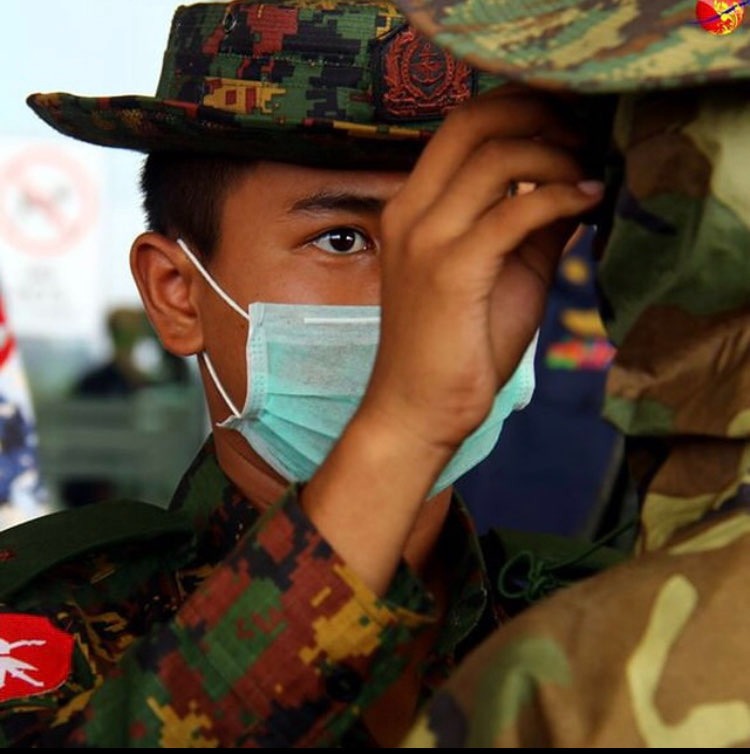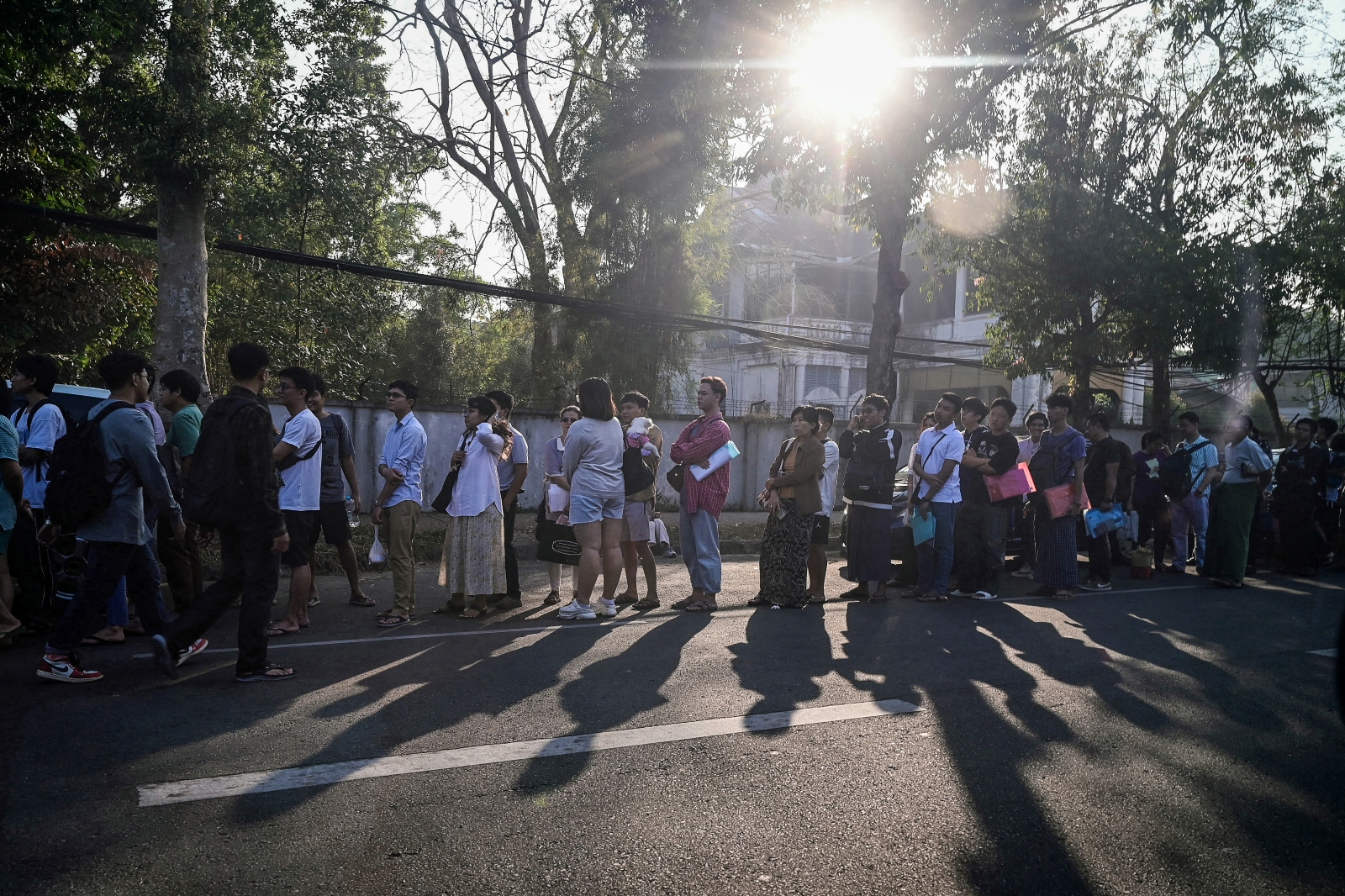Since being banned from Facebook, some of the most prominent spreaders of hate speech and disinformation have moved to Telegram, and fact-checkers say the messaging app is doing little to regulate its platform.
By ANDREW NACHEMSON | FRONTIER
Faced with increasing restrictions and closer scrutiny on Facebook – and in some cases outright bans – some of Myanmar’s most prominent peddlers of pro-military disinformation and hate speech have turned to the encrypted messaging service Telegram to spread their propaganda.
Ostensibly a private messaging app, Telegram has grown in popularity thanks to “channels” that users can subscribe to for regular updates from other accounts. Unlike Facebook or Twitter, where the default is for posts to be public, Telegram posts can only be seen by a channel’s subscribers.
Myanmar Hard Talk (MHT), which was banned from Facebook on October 23, 2020, has found a new home on Telegram. A Frontier investigation at the time found that the outlet was sharing disinformation and hate speech targeting the Rohingya Muslim minority and the National League for Democracy. The NLD was overthrown in a military coup on February 1 after winning a landslide victory in the November 2020 general election.
Unable to share content on Facebook, MHT now posts to almost 13,000 subscribers on its Telegram channel, a dramatic reduction in reach compared to the over 240,000 followers it once had on Facebook. But its subscribers on Telegram are growing rapidly; just a month ago, it had barely 6,000.
MHT posts both original content and articles from state media – the latter often passed off as its own work. On August 5, it sent a post to subscribers that said the military regime was continuing to accept returnees stranded abroad due to COVID-19. The post was attributed to “MHTnews”, but it had actually been copied and pasted directly from state media. While the content was broadly accurate, regurgitating state media reports without attribution benefits the military by presenting its propaganda as independent reporting.
Other posts spread what appears to be disinformation. On July 24, MHT posted that NLD supporters broke into a home in Mandalay, robbing and stabbing the homeowner. While the robbery was reported by other media outlets, none reported that the thieves were NLD supporters or that there was any political connection to the crime. The MHT post provided no evidence to support its claim that NLD supporters were responsible.
MHT has also continued to offer its Telegram subscribers the talk shows that were a mainstay of its Facebook page. One recent guest was pro-military social media influencer Shwe Yupar Oo. Since Facebook started banning many of Shwe Yupar Oo’s pages, she too has started a Telegram channel, which today has around 7,200 followers.
In the recent MHT video, Shwe Yupar Oo says she was born into a military family and understands the “hard life and feelings of soldiers”. She defended the junta’s response to the COVID-19 crisis, which has been described as disastrous by most other observers, claiming that the military “cares a lot about the health of the people”. Shwe Yupar Oo even applauded the junta for providing oxygen to people in need, despite reports that security forces have banned private oxygen sales and sought to take over private oxygen plants.
Some of her Telegram posts appear to be outright disinformation. In July, Shwe Yupar Oo wrote on her channel that five doctors who were arrested in North Dagon Township had been charging COVID-19 patients K1 million to K1.5 million (approximately US$600 to $900) for treatment. “So the five greedy illegal doctors were arrested with 23 oxygen tanks,” she said. But she provided no evidence for this claim, and independent media reports said the doctors had been entrapped by the junta: after being called to what they believed was a COVID-19 emergency, they were instead arrested for participating in the Civil Disobedience Movement.

Anti-Rohingya conspiracies
Ultranationalist media outlet Myanmar National Post also has a presence on Telegram, which it uses to spread disinformation and anti-Rohingya conspiracy theories. In response to a National Unity Government press conference on June 4 at which it promised citizenship for the Rohingya, MNP published several misleading posts on its Telegram channel.
It accused media outlets of taking bribes to spread the “fraudulent ethnic name” of the Rohingya. The outlet also referred to common nationalist conspiracies, such as that the Organization of Islamic Cooperation had been pressuring media and pro-democracy activists to accept the Rohingya, and reiterated that there is no such thing as a Rohingya ethnic group.
The OIC is an inter-governmental organisation of countries with significant Muslim populations that was formed to “protect the interests of the Muslim world”. The bloc has been fiercely critical of Myanmar’s treatment of the Rohingya – it initiated the process that led to The Gambia filing a genocide case against Myanmar at the International Court of Justice – and consequently many unfounded conspiracy theories about its activities have taken root in nationalist and even mainstream circles.
Similar claims were made by a Telegram user called Sergeant Phoe Si, who accused the OIC of funding anti-military revolutionaries, comparing attacks from pro-democracy armed groups to “jihadist attacks”. In another post, he falsely claimed the “NLD worked hand in hand with the OIC to stay in power.” In fact, the NLD had a contentious relationship with the OIC, due to its decision to defend the military’s atrocities against the Rohingya.
After Afghanistan’s capital, Kabul, fell to the Taliban in mid-August, Sergeant Phoe Si posted a conspiracy-riddled message on Telegram about the implications for Myanmar. He asserted that between 2014 and 2021, Myanmar’s Muslim population rose from 2.1 percent to 4.3 percent and 5,000 new mosques were built. The latter number seems to be taken from the 2014 census, not 2021 as claimed, based on an estimation of Myanmar’s Muslim population.
Credible estimates on the number of mosques in Myanmar are difficult to find, but the locally based Islamic Council said in 2019 there were 1,000 mosques in the entire country outside of Rakhine State. This makes it unlikely 5,000 new mosques have been built, particularly as Muslims have had difficulty reopening old mosques that were closed after sectarian violence in multiple regions, or even renovating existing mosques.
Citing the statistics supposedly showing an increase in the Muslim population, Sergeant Phoe Si predicted a “major conflict for Burma in the future”. The post also claimed that Myanmar is likely to become a major market for weapons sales by the Taliban, who have come into possession of many weapons and left behind by the US forces.
Coordinated behaviour
Another example of this flow of bad actors from Facebook to Telegram is Ko Khant News. It has a Telegram channel with some 8,500 subscribers, as well as a private Facebook group under the same name. Identical content regularly appears on both platforms and one of the moderators, who is sometimes referred to as Ko Khant by other users, was implicated in a previous Frontier story for spreading false information about ethnic armed groups massacring civilian trainees.
Frontier analysed 3,675 posts from six different pro-military Telegram accounts, including Shwe Yupar Oo and Ko Khant News, and found that the users’ main focus was civilian armed resistance, with 1,880 mentions, followed by ethnic armed groups, with 735 mentions. Frontier also found evidence that some of the accounts seemed to engage in coordinated behaviour – a channel called Myanmar Update News and another called Update News shared identical posts 63 times, for example.
The outlets also regularly forward posts, including disinformation, from other pro-military accounts. For example, Ko Khant News forwarded a post from Update News that falsely claimed Cambodia’s Prime Minister Hun Sen had referred to junta chief Min Aung Hlaing as “prime minister”. It cited an article by the Phnom Penh Post, which had actually reported that Hun Sen called him chairman of the State Administration Council. Frontier also analysed the content that those six channels most frequently shared, finding that the military-run MWD News was shared the most frequently, with 103 posts.
Facebook has taken a strong stance against disinformation and coordinated inauthentic behaviour since the Rohingya crisis in 2017, when it was heavily criticised for failing to combat hate speech and disinformation targeting the Muslim group. The platform introduced new policies specific to Myanmar before the November election and after the coup,and regularly releases reports on networks it has disrupted. But other social media platforms, like YouTube and TikTok, have been criticised for being less proactive in tackling hate speech and disinformation even as many of the same people facing restrictions and bans from Facebook migrate to those platforms.

From journalism to Telegram
The Maung Sue Hle account on Telegram is run by a former editor from Eleven Media named Ko Phyo Wai Win. Eleven is one of the country’s largest media organisations, and unlike many of its contemporaries has not been banned by the regime.
In one Telegram post, Phyo Wai Win said that he had tried to edit a Wikipedia page to explain that the military came to power because of voter fraud, echoing the Tatmadaw’s justification for the coup (allegations of voter fraud were rejected by independent election monitors). Phyo Wai Win said in a Telegram post that he had been unable to alter the page because Wikipedia had banned his IP address from making edits for three years. Instead, he encouraged his followers to edit the page for him. “As we all know what started the coup, let’s fix it,” he wrote.
Despite his apparent support for the regime, Phyo Wai Win insisted in an interview with Frontier that he criticises both sides and was even briefly arrested for taking pictures of the police in May. “If you do not support the NLD, you will be killed, but we face arrest if we criticise the SAC,” he said.
The NLD had a poor record on media freedom, prosecuting journalists under various laws for social media posts and articles it deemed to be defamatory or destabilising. Phyo Wai Win himself spent several weeks in prison in late 2018 over a report on regional government spending. But far more journalists have been arrested and faced physical harm under the junta – the Committee to Protect Journalists said there were over 30 in prison as of July. Many have reported being tortured in detention, while others have been injured by security forces – including a Frontier journalist, who suffered a gunshot wound while covering a protest in Mandalay.
Despite his claim to criticise both sides, Phyo Wai Win’s Telegram channel was previously named “maloenipawtwayleepal”, which roughly translates to “motherfucker NLD supporters fuck you”, and his content was much more anti-NLD than anti-military. Asked about the name, he again insisted that he is critical of both sides, but after the interview changed his handle to “kokophyoewei”.
Since the coup, Phyo Wai Win has received threatening messages from pro-democracy supporters and been labelled adalan, or military informer. He said Shwe Yupar Oo has faced similar threats, with pro-democracy activists allegedly livestreaming in front of her home, threatening to kill her and destroy her car. She now has security provided by the military, according to Phyo Wai Win.
These are likely not idle threats. The NUG reported that 87 associates or officials of the military regime had been killed during the month of July alone.
“In the conflict over the seizure of power, there is a group who motivated young people to die, to risk their lives on the streets. I do not like that group,” Phyo Wai Win said of the NUG during the interview with Frontier in August. In contrast, he did not condemn the Tatmadaw for its killing of more than 1,000 unarmed protesters.
No regulation
A fact-checker working for Think Before You Trust, a group that debunks false news on social media, said the organisation has noticed an uptick in Telegram channels spreading disinformation, and cited many of the same accounts Frontier had flagged. Many posts spread false news about armed resistance, and many others attempt to refute reports from independent media outlets. The fact-checker, who asked not to be named for her safety, said the Sergeant Phoe Si account, for example, has been “known as a military lobbyist on Facebook for the past four or five years.”
Another pro-military Telegram account targets women from the pro-democracy movement, often sexually harassing them online by posting sexually explicit images of activists. The channel only has around 8,000 subscribers, but some of its posts have received over 40,000 views, indicating the posts are likely being forwarded within private chats.
One post on this channel shared images of a dead anti-military activist’s body, who had fallen to her death while attempting to evade arrest. Her skirt had ridden up to expose some of her body, which the Telegram user mocked in sexually suggestive ways.
This channel has since been blocked by Telegram for some users, with an in-app notice saying it “can’t be displayed because it was used to spread pornographic content”, but it remains accessible to other users. Telegram did not respond to requests for comment from Frontier on this, or any other issue raised in this article.
The fact-checker confirmed that many Facebook accounts that have been shut down are still posting on Telegram, largely because the platform is much less regulated than Facebook. The source said Telegram channels are a “good place to spread fake news and misinformation because you can write whatever you want”.
But disinformation and hate speech is only part of the Telegram story. Many internet users in Myanmar have started using Telegram since the coup because it is perceived as more secure than WhatsApp or Facebook Messenger, and has not been blocked by the authorities. Another advantage of Telegram is that, unlike Signal – another popular option for those concerned about digital security – it does not require users to make their phone number public.
“The military cannot track what we say online,” said one activist. “One of the problems with Signal is that we have to open an account with a phone number, so the military council can follow us. They have the phones of many activists. If someone is arrested during a protest, they will try to track us down through those phones.”
Anti-military users have also taken advantage of Telegram’s channel function, which has been abused by disinformation peddlers to send false news out to many people at once. Pro-democracy journalist Mratt Kyaw Thu, for example, regularly posts news on his Telegram channel, where he has nearly 190,000 subscribers, far more than any of the pro-military accounts Frontier viewed.
Still, the fact-checker called on Telegram to work with civil society social media monitoring groups in Myanmar and hire staff that can read Myanmar-language content. She said if Telegram does not take action, disinformation and attacks on women will continue, along with hate speech targeting ethnic, religious and political groups.
Correction, September 15: The article incorrectly identified Phyo Wai Win as Wai Phyo. Both worked for Eleven Media Group but Wai Phyo was imprisoned in 2016 and Phyo Wai Win was detained in 2018.







